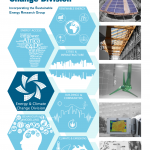ECCD engagement
The Energy and Climate Change Division undertakes a variety of research in collaboration with local authorities, businesses and international partners while also hosting and participating in a variety of events allowing us to engage with members of the public. Click on the relevant logo to see a list of research project and relevant news, or see below for the latest updates on ECCD engagements.
Updates:
Assessment of potential for rooftop solar PV in Hampshire and Sussex 2025 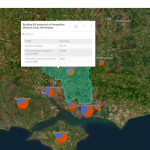
Rooftop solar means greater generation of renewable energy, closer to where it is used. However, understanding the possible scale of rooftop solar requires mapping the potential, building by building.
ECCD organise Sustainability Strategic Plan: 2024 update 2024 
ECCD organise and host the Sustainability Implementation Group (SIG) update event for the Sustainability Strategic Plan
ECCD host workshop for Health Homes First application 2024 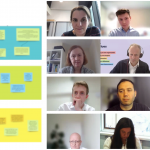
Associate Professor Stephanie Gauthier hosted an online workshop project stakeholders and partners to develop plans for the Healthy Homes First application.
Guidelight – UK Power Networks, electricity distribution 2024 
Low-income and vulnerable consumers receive grant funded LCTs through local authority retrofit schemes, but without supporting households to switch tariffs or using digital optimisation tools, retrofit schemes risk creating a socio-technical performance gap that this project will evidence and address through a range of capability-based interventions that are tailored to those in vulnerable circumstances.
ECCD team contribute to COP 28 2023 
The ECCD team, lead by Prof. Bahaj contributed to the topic of energy access, cities and infrastructure at COP28, also contributing to the debate about ocean resources.
Energy and Sustainability MSc student wins best paper award at the People and Buildings Conference for Masters Students 2023 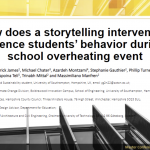
Yu Gao, an Energy and Sustainability MSc student supervised by Prof. Patrick James wins the best paper award at the 2023 People and Buildings Conference for Masters Students
ECCD host the International Conference on Evolving Cities and Towns (ICEC 2023) 2023 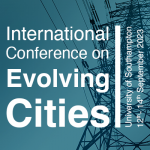
ECCD organised and run the 4th International Conference on Evolving Cities (ICEC 2023) held at the University of Southampton from 12 – 14 September 2023.
Overheating Risk Assessment for UK schools 2023 
This project is a response to the UK’s overheating risk introduced by climate change. By 2070, climate projections for the UK estimate an increase in seasonal average temperatures of up to 5.1°C in summer as well as more intense and frequent extreme events such as heat waves.
ECCD welcome Year 10 students for a one-week Civil Engineering work experience 2023 
ECCD welcomed five year 10 students from local, Southampton-based secondary schools for a one-week work placement from the 17th – 21st July.
ECCD host Board Members of Crédit Agricole Normandie 2023 
ECCD hosted a delegation of Board Members of Crédit Agricole Normandie with representatives from Southampton City Council, Equans and Exxon talking to the delegation about climate, energy and innovation.
ECCD host Pioneering Places Workshop 2023 
ECCD host a hybrid workshop with local stakeholders about Southampton’s non-technical barriers on the pathway to net zero as part of the Pioneering Places project.
Pioneering net zero delivery for the City of Southampton 2023 
This project, currently in its second-phase will build on Southampton’s characteristics, opportunities and challenges through developing a combined techno-economic methodology coupled with stakeholder engagements to support a coherent feasibility studies to address its pathway to net zero.
ECCD exhibit at the Southampton Science and Engineering Festival (SOTSEF) 2023 2023 
The Energy and Climate Change Division exhibited at The Science and Engineering Day held across Highfield Campus and Boldrewood Innovation Campus on Saturday 18th March.
ECCD exhibit at The Big Sustainability Expo (Southampton) 2022 2022 
The Energy and Climate Change Division exhibited at The Big Sustainability Expo (Southampton) 2022 held at St Mary’s Stadium, Southampton on Thursday 22nd September.
People and Buildings 11th Master Conference (MC2021/22) 2022 
ECCD, in partnership with the London Metropolitan University and the University of Westminster, hosted the 11th People and Buildings Masters Conference, taking place at the Hogg Lecture Theatre, University of Westminster, London on September 16 from 10:00-18:00.
International Conference on Evolving Cities 2022 2022 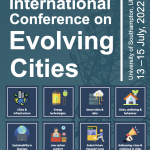
ECCD successfully organised and hosted the 3rd International Conference on Evolving Cities (ICEC 2022) at the University of Southampton on 13th-15th July 2022. The Conference had over 150 delegates with 11 keynotes, 48 oral presentations and 10 posters.
LATENT – outreach and engagement 2022 
Article listing the range of outreach and engagement activites that have been undertaken as part of the LATENT project
ECCD organise Civil Engineering work experience for Southampton-based Year 10 students 2022 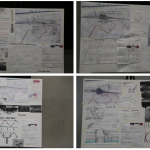
ECCD welcomed four year 10 students from local, Southampton-based secondary schools for a one-week work placement from the 18th – 22nd July.
Showcasing Engineering for Development 2022 
ECCD, in partnership with the Royal Academy of Engineering, hosted the inaugural Showcasing Engineering for Development one-day conference, taking place at the Royal Academy of Engineering, London, UK on March 18 from 09:30-16:00.
ECCD undertake research for the NFRC building resilience of roofing technologies in a changing climate report 2021 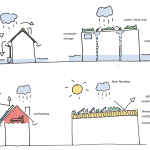
NFRC report presents research undertaken by ECCD investigating the impact that climate change will have on roofs covering the existing stock of buildings across the UK.
Renewable Energy in Saudi Arabia 2021 
Energy and Climate Change Division (ECCD) undertake research to support the Kingdom of Saudi Arabia’s (KSA’s) Vision 2030. The research is in collaboration with the Department of Electrical and Computer Engineering, King Abdulaziz University (KAU), supported by King Salam Bin Abdulaziz Chair in Energy Researcg and KSA Ministry of Education.
ECCD present at Portsmouth City Council’s BIG Climate Conversation 2021 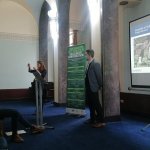
The Energy and Climate Change Division attended Portsmouth City Council’s Big Climate Conversation held at Portsmouth Guildhall on 9 and 10 November 2021.
Early Hampshire Energy Mapping project results presented 2021 
Masters student Meghan Kingsley Walsh recently presented preliminary results from her Hampshire Energy Mapping dissertation project to Hampshire County Council’s Climate Change Expert Consultative Forum. Meghan’s presentation focused on the geo-spatial distribution of energy use and it’s relationship to fuel poverty, deprivation and area level age profiles.
Hampshire Energy Mapping project 2021 
Investigator: Dr Ben Anderson Masters student: Meghan Kingsley-Walsh Hampshire County Council declared a Climate Emergency in June 2019 and have since set two targets for the County as a whole: To be carbon neutral by 2050 To be resilient to the impacts of a 2oC temperature rise It is becoming widely recognised that decarbonising national and local energy systems will ...
Green City Performance Tracker 2021 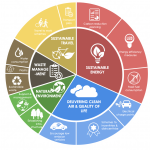
The Green City Performance Tracker has been developed to provide a robust assessment of Southampton City Council’s Green City Charter (GCC) to help the City in its transition towards zero carbon making it a cleaner, greener and healthier city.
Dr Ben Anderson invited to join Hampshire County Council’s Expert Stakeholder Forum 2020 
Following participation in Hampshire County Council’s Climate Change Expert Consultative Forum in August 2020, ECCD’s Dr Anderson has been invited to join the Council’s follow-on Expert Stakeholder Forum. The forum held it’s first (virtual) meeting on 8th December 2020 to review and comment on the Council’s current overall strategy and Action Plan as agreed at ...
Decarbonisation of the Winchester District 2020 
Winchester City Council (WCC) has an ambitious aspiration for the Winchester District (coves approximately 250 square miles) to become carbon neutral by 2030 with this research project investigating options including a low carbon energy hub, building retrofit and mapping of EV charging and network resilience.
ECCD Contributes to the new University of Southampton Sustainability Strategy 2020 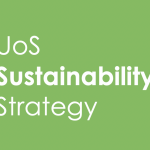
The University of Southampton has developed and launched a new Sustainability Strategy to sit alongside the University Travel Plan, Estates Strategy and Biodiversity Policy. The Energy and Climate Change Division (ECCD) team has contributed to the consulting phases and made comments on the approaches to be undertaken within the Strategy. Prof Bahaj is also leading ...
ECCD responds to Energy Networks Association ‘flexibility’ consultation 2020
Dr Ben Anderson and Dr Tom Rushby recently responded to the Energy Networks Association’s consultation on ‘flexibility’. In a a short paper summarising relevant ECCD and colleagues’ research to date they concentrated on the following questions: New DSO Services–2020 Product 5 Q6 At what point do you believe it is appropriate to standardise new products? For example, should ...
ECCD launches the Green City Charter Tracker 2020 
The Energy and Climate Change Division (ECCD) introduce the newly developed Performance Tracker for Southampton City Council’s Green City Charter (GCC) as part of the GCC first celebration.
Heat Networks 2020 
Heat networks provide a high efficiency, low cost option for energy supply based on combined heat and power concepts. Analysis of heat networks performance and deployment of smart heating technologies are mainly applied in heat networks in social housing settings within the cities of Southampton and Portsmouth.
Dr Ellis Ridett 2020 
Visiting Researcher in Energy and Sustainability
UK covid 19 lockdown air quality analysis submitted to DEFRA 2020 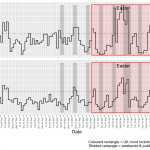
Researchers from SERG have been collaborating with colleagues at the University of Auckland, NZ to analyse the effects of UK Covid lockdown on the most recent Southampton air quality data. This work has subsequently been submitted to DEFRA in response to a call for evidence. The analysis suggests that overall 2020 was already a ‘cleaner air’ year ...
SERG submits response to Sixth Carbon Budget – Call for Evidence 2020 
SERG’s Dr Ben Anderson has just submitted a response to The Climate Change Commission’s ‘The Sixth Carbon Budget and Welsh emissions targets – Call for Evidence‘. Ben’s comments focused on: Question 8.What evidence do you have of the co-benefits of acting on climate change compatible with achieving Net Zero by 2050? What do these co-benefits mean for ...
Peak residential demand analysis for New Zealand offers insights to EECA 2019 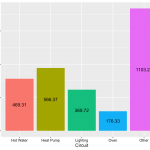
Analysis of New Zealand GREENGrid household electricity demand data conducted by Dr Ben Anderson and colleagues at the University of Otago as part of Ben’s MSCA Global Fellowship have provided unique insights into the compnents of peak residential electricity demand in New Zealand. The analysis, which was also supported by the New Zealand Energy Efficiency and ...
Analysis of New Zealand electric vehicle charging patterns contributes to major report 2019 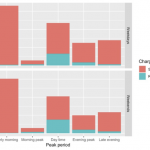
Dr Ben Anderson’s work analyzing the charging patterns of a sample of electric vehicles monitored by FlipTheFleet in New Zealand has contributed to a major new report to the New Zealand Parliamentary Commissioner for the Environment (PCE). The report, which covers a wide range of analyses from a range of contributors incorporated Ben’s analysis, conducted jointly ...
SERG submits response to Ofgem 2019 code review 2019 
SERG’s Dr Ben Anderson has just submitted a response to Ofgem’s (2019) Access and Forward-Looking Charges Significant Code Review – Winter 2019 working paper. Ben’s comments focused on: How options could be applied to small users and Ofgem’s Behavioural Insight Report on small users Ben’s comments summarised SERG’s work on the flexibility of electricity demand, energy use habits ...
ECCD research portfolio
Realising the Isle of Wight’s aspiration for renewable energy power generation and local consumption 2019 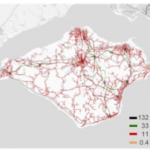
In the UK, the Isle of Wight (IoW) wish to become self-sufficient in electricity from renewable sources, which is likely to be achieved through the deployment of utility-scale solar PV farms augmented with rooftop solar PV systems.
CareTeam outreach 2019 
Numerous local and national events have been attended and presented to help disseminate CareTeam to a wide ranging demographic.
ECCD host the International Conference on Energy and Cities (ICEC 2019) 2019 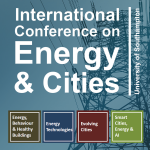
The International Conference on Energy and Cities (ICEC2019) address energy flows in cities with special emphasis on renewable energy and energy efficiency approaches within the city and beyond.
Insights into peak demand effects of heat pumps in NZ presented at BRANZ workshop 2019 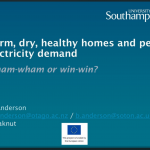
Dr Ben Anderson has presented insights from his SPATIALEC EU MSCA Global Fellowship as part of an invited presentation at a BRANZ-hosted workshop on designing a future NZ domestic Energy End-Use study held in Wellington on April 4th 2019. Ben discussed the contribution of hot water and heat pump use to peak demand in NZ ...
Key Cities Meeting – City and the Environment 2019 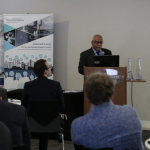
21st February 2019 | University of Southampton The Southampton City Council has joined forces with the University of Southampton and hosted a Key Cities Meeting addressing challenges on air quality, energy efficiency, transport, and infrastructure development. The meeting urges local authorities to adopt a “healthy and prosperous” vision towards air quality and energy efficiency in towns and ...
ECCD host Care in the Square as part of CareTeam 2018 
ECCD hosted Care in the Square as part of the CareTeam project, it was a free to attend fete of care hosted at the Guildhall Square in Southampton City Centre on 5th September 2018.
University of Southampton CareTeam Supports Independent Living 2018 
Staff from the Energy and Climate Change Division (part of the CareTeam) at the University of Southampton are involved in an Innovate UK funded project to Support Independent Living for adults who require it. CareTeam is a collaborative project bringing together Nquiringminds (software developer), Southampton City Council and the University of Southampton. The aim of ...
Care In the Square – List of Participants 2018 
CareTeam is a collaborative project bringing together Nquiringminds (software developer), Southampton City Council and the University of Southampton. The aim of CareTeam is to provide the necessary digital technology and service to support independent living and help carers support their loved ones more efficiently and effectively. On the Wednesday 5th of September 2018 at Guildhall Square, ...
Solar Shaded Car Park Project 2018 
This project aims to implement a demonstration programme encompassing an operational research and experimental analysis of how solar photovoltaics can be utilised and maintained as shading components in carports.
Liveable Cities – Case studies 2018 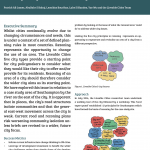
Alongside the Little Book Series, 9 Case Studies were produced from the Liveable Cities work to showcase the breadth and applicability of the Liveable Cities research to practice and everyday life.
Liveable Cities – Little Book series 2017 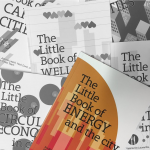
Following the roadshows and a successful closing event in the House of Lords, the Liveable Cities – Little Book series are now available online to download as PDF.
Video of research project Liveable Cities available to view 2017 
SERG researchers participated into a 5-year programme “Liveable Cities” to transform the engineering of cities to deliver societal and planetary wellbeing within the context of low-carbon living and resource security. More videos by SERG researchers can be found below: Leaky Houses – Luke Blunden Electricity Monitoring Field Study for Carbon Savings – Leonidas Bourikas Rezoning as a Tool for ...
THERMOSS: Building and district thermal retrofit and management solutions 2017 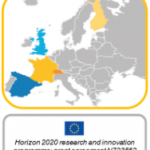
The THERMOSS project is a response to the 20% primary energy consumption reduction targets set by the 2012 European Energy Efficiency Directive (EED). This calls for effective and wide-scale building heating and cooling systems upgrade strategies. Such strategies will only be successful if they are based upon the right combination of technology innovation and ...
CareTeam – Adult Support Digital Platform 2017 
CareTeam is an adult support digital platform that comprises a mobile app and household and personal sensing technologies. This platform aims to support independent living and help carers support their loved ones more efficiently and effectively. The project aims to help adults who currently receive home care to remain independent, comfortable and active, living in ...
Urban planning and environmental impact 2017 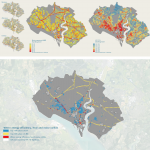
This research considers the opportunities for change that exist within urban, city-scale infrastructure. It is concerned with future pathways to address negative conditions such as sound and air pollution, fragmentation, ghettoization and impoverished areas.
UK – China Low Carbon Cities Project 2016 
City-wide analysis to propel cities towards resource efficiency and better wellbeing Many cities in the world are putting in place their own robust carbon reduction strategies in response to, or in advance of, leadership from central government. As the powerhouses of economic growth, cities use vast amounts of energy and consume resources from hinterlands that stretch ...
Thermal comfort and indoor environments 2015 
Heating, is the main component of energy demand in UK dwellings and is often associated with thermal comfort. Our research investigates how domestic buildings and their occupants use energy and how they interact with building systems in order to adjust their comfort.
Energy Performance and Thermal Comfort in a High-Rise University Halls of Residence 2015 
This project intends to investigate the impact of occupant-related parameters on energy performance using a newly built ‘BREEAM excellent’ University Halls of residence building as a case study. More specifically, it will address the challenge of achieving energy efficiency and comfortable indoor conditions in a building which accommodates international students with potentially very different and ...
Impacts of Urban Interventions for the Reinvigoration of Secondary and Tertiary High Streets 2015 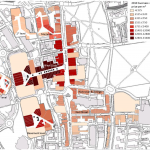
The aim of this work is to understand the impact of small-scale urban interventions on declining secondary/tertiary high streets and how this relates to stakeholders’ perceptions and behaviours. The study also investigates the hypothesis that undertaking small-scale interventions assists in generating a collective approach among stakeholders for the regeneration of secondary retail areas.
Liveable spaces and communities 2013 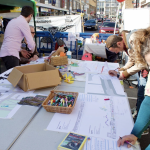
Research develops evidence to inform regeneration strategies for city planners and local authorities to create liveable spaces within cities, ensuring areas meet the needs of inhabitants on a micro and macro scale.
Liveable Cities 2013 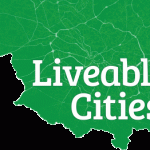
How do we address energy consumption to meet low carbon targets? How do we address infrastructure ‘lock in’ to improve the carbon performance of the urban environment? How do we engender and embed low carbon pathways and engineering solutions for demand reduction and power generation in cities? Introduction Launched in 2012, Liveable Cities is a five year £6.2m research ...
Title: Low Carbon City Strategy Researcher: Yue Wu Supervisors: AbuBakr Bahaj and Luke Blunden Abstract GHG emissions are becoming a global concern. The UK has legally bound a CO2 emission reduction target that by 2050 at least 80% of GHG emission shall be reduced based on the emission level of 1990. Consequently, the local authorities also published their own ...
Solar PV in Food Transport Refrigeration 1997 
The Energy and Climate Change Division has led a programme to develop what is believed to be the world’s first solar powered refrigeration unit installed on a working articulated vehicle for Sainsbury’s Supermarkets Ltd.
SCOLAR – UK national programme of PV for Schools 1996 
The Scolar Programme for Photovoltaics was initiated as a response to the Government’s Foresight Challenge to develop photovoltaic (PV) technology and to raise awareness of PV in schools and other educational establishments.
















